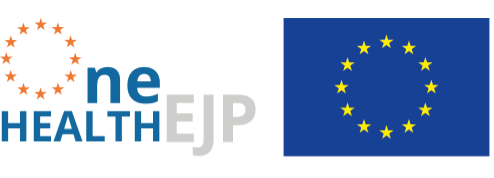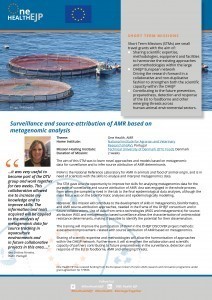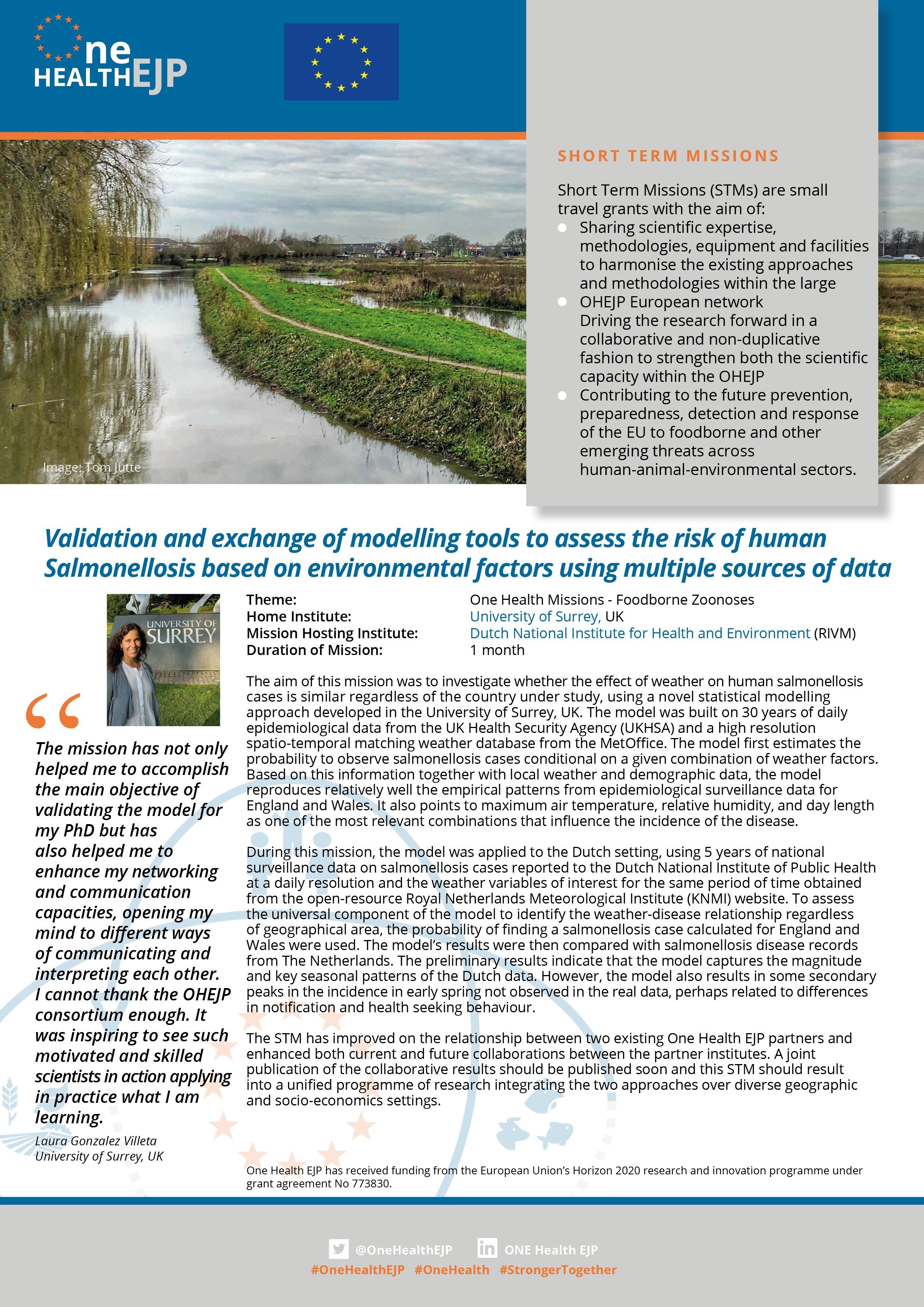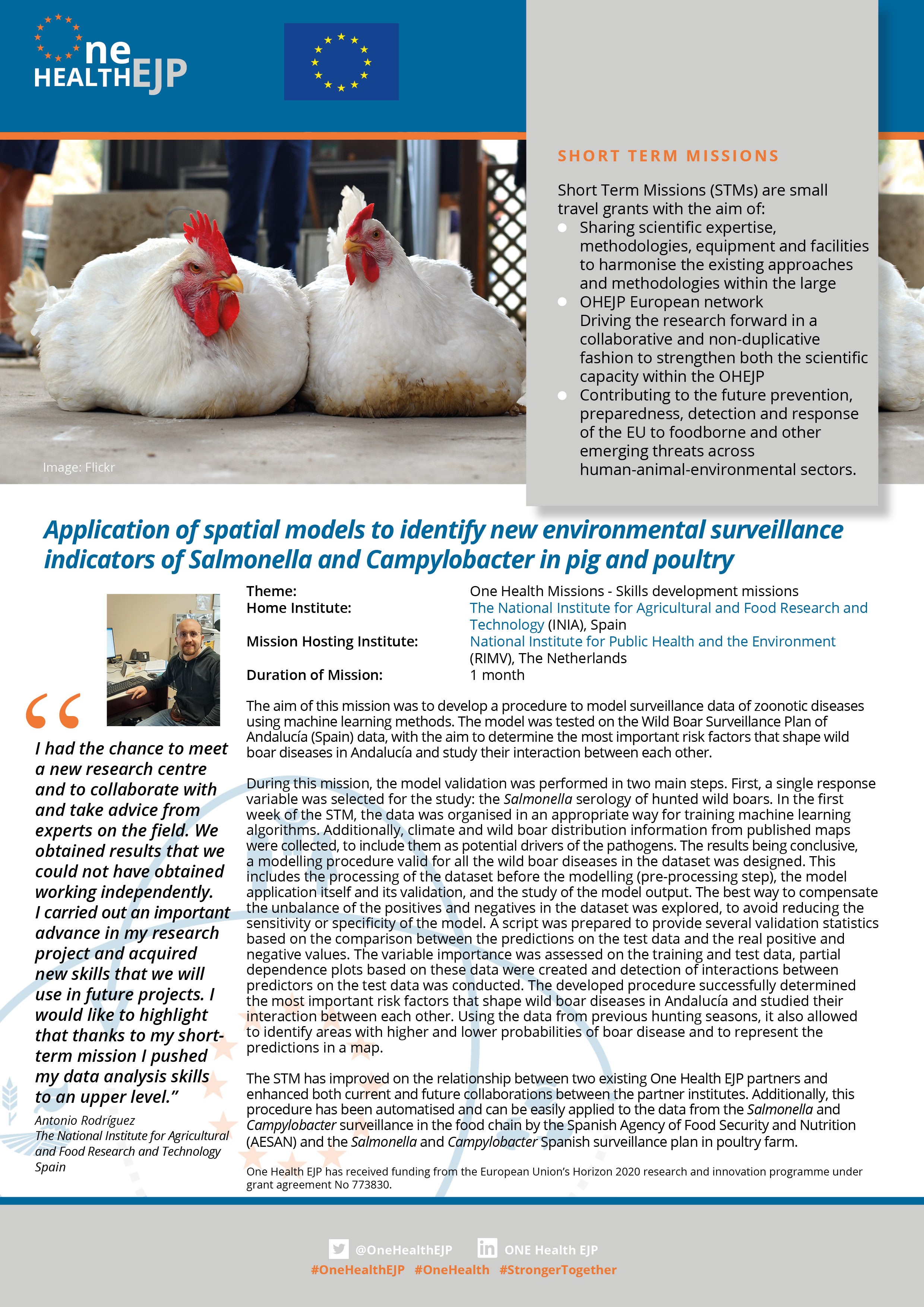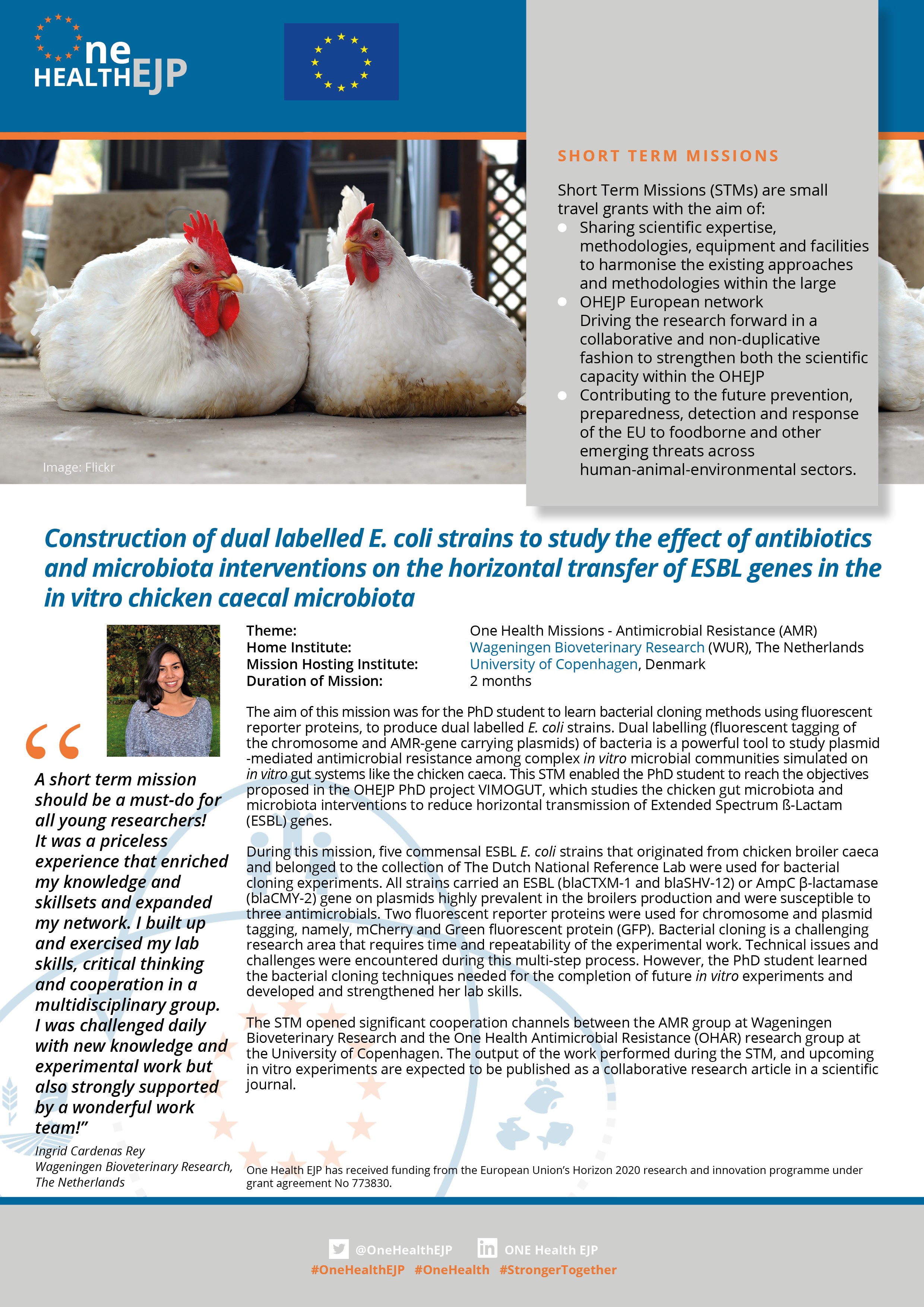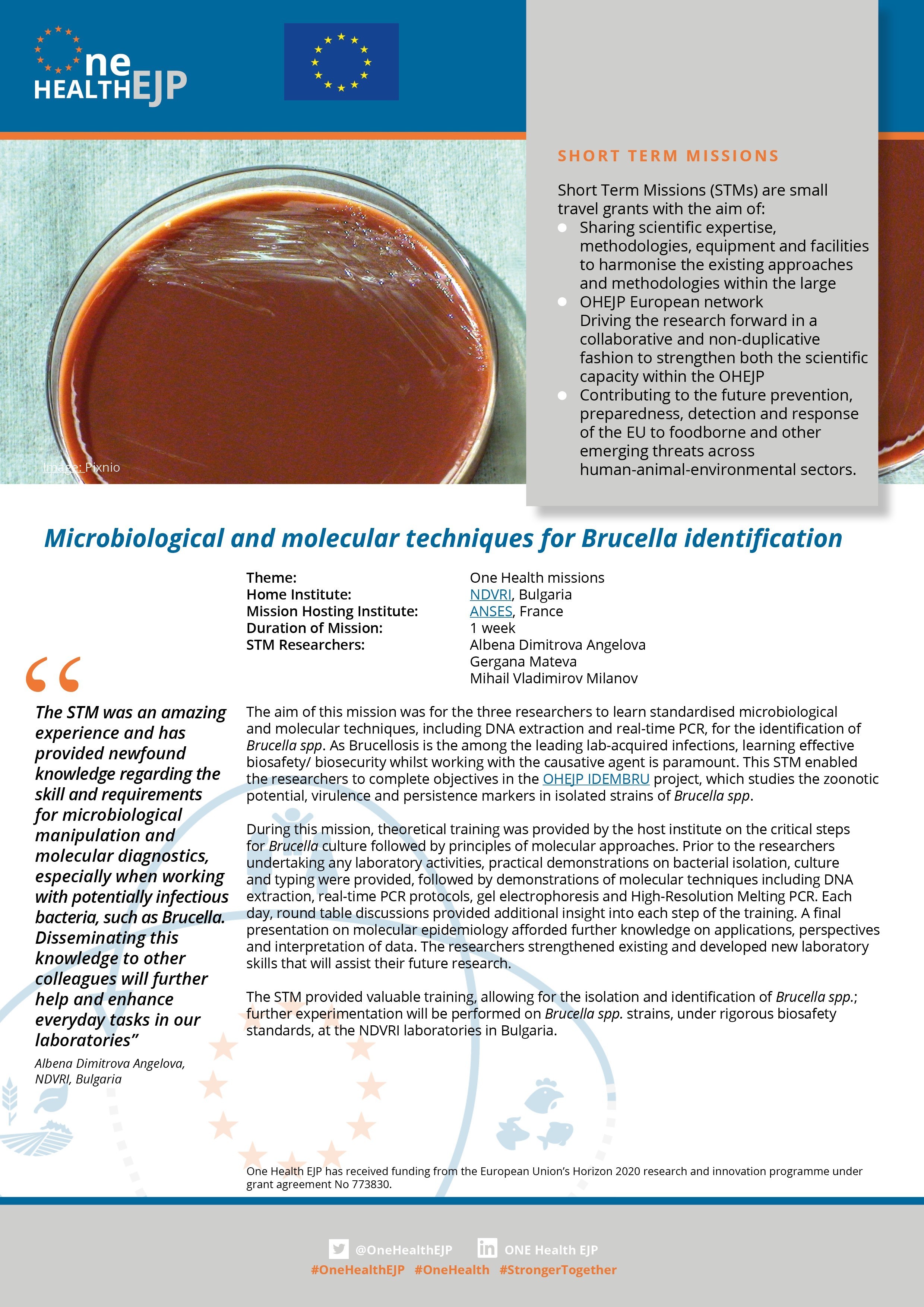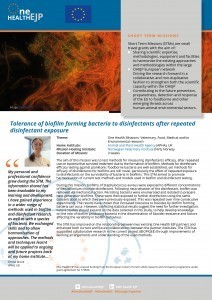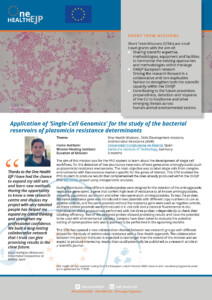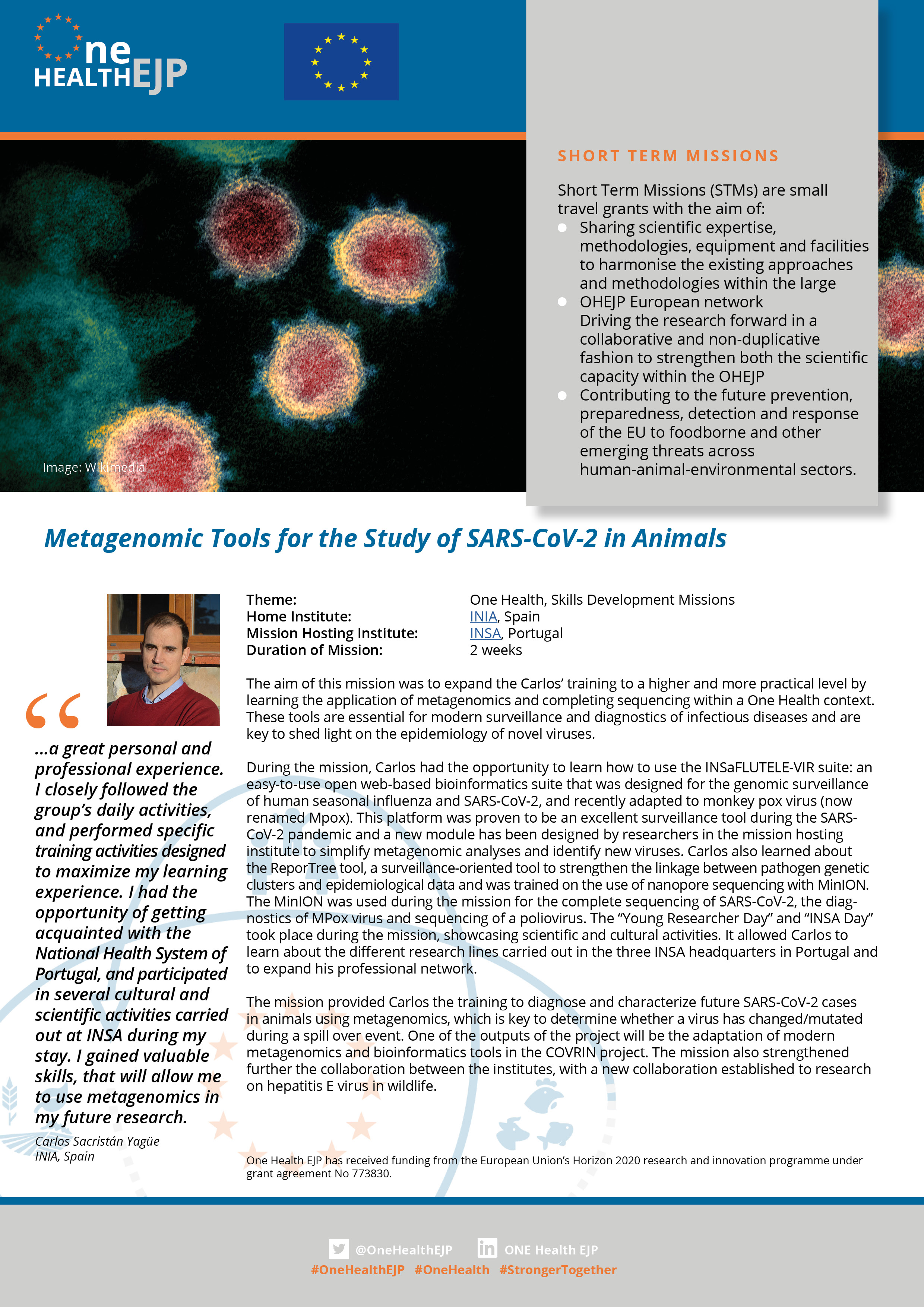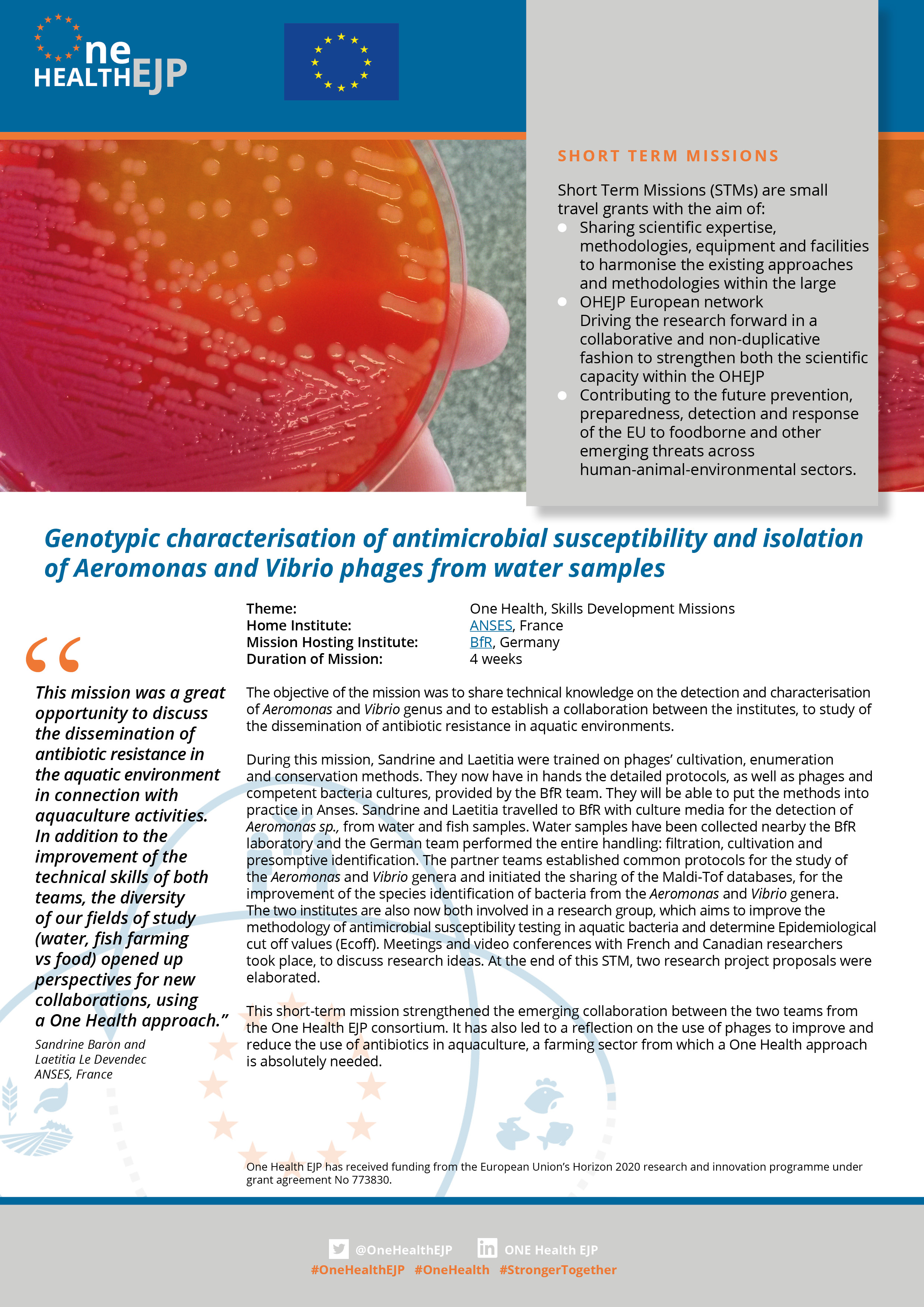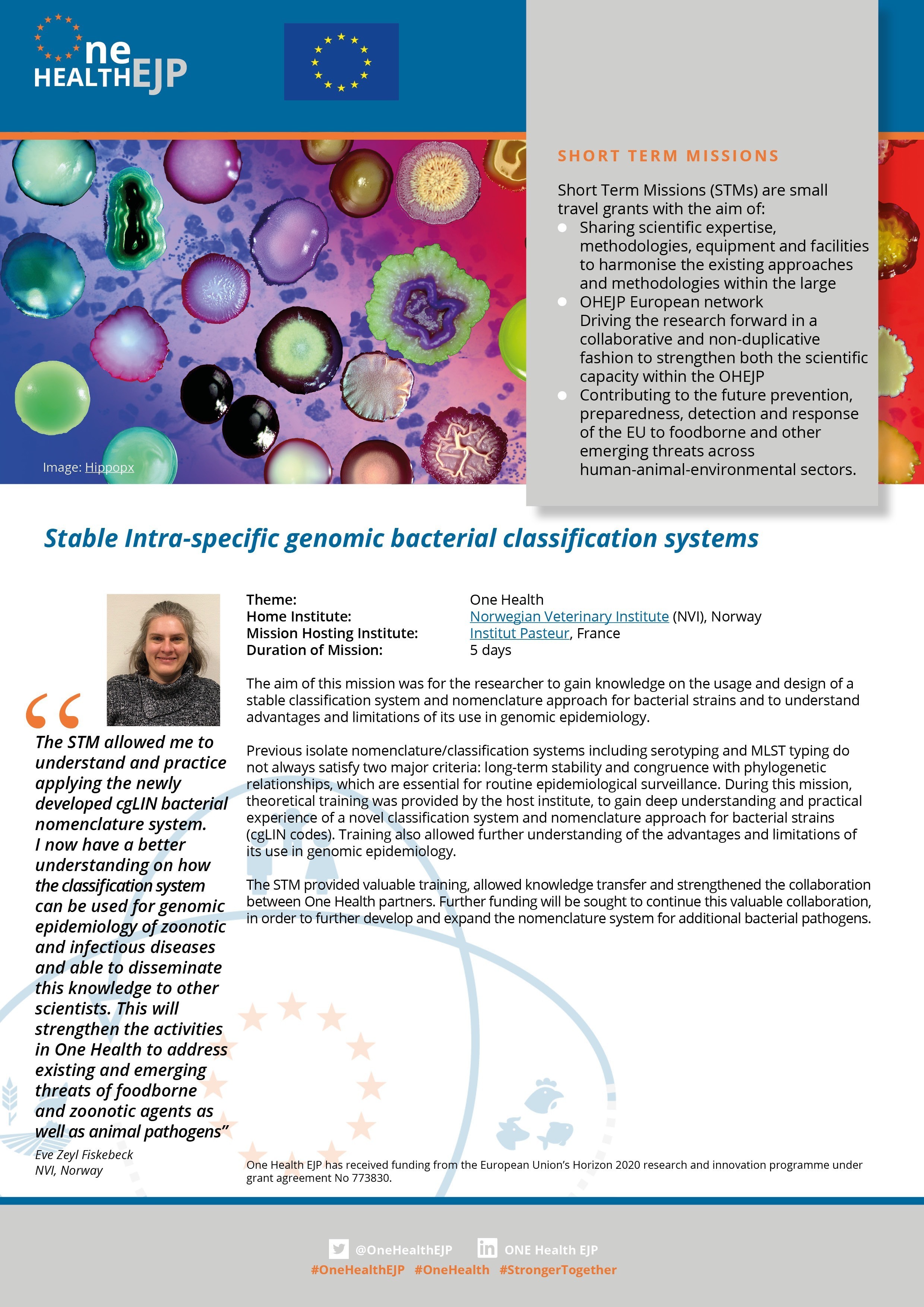One Health EJP Short Term Missions Awarded for 2022
Surveillance and source-attribution of AMR based on metagenomic analysis
Details:
| STM Researcher: | Ana Christina Ferreira |
| Home Institute: | National Institute for Agrarian and VeterinaryResearch (INIAV), Portugal |
| Mission Hosting Institute: | Technical University of Denmark (DTU Food), Denmark |
| Duration: | 2 weeks |
| Theme: | One Health, AMR |
Aim of the mission
The aim of this STM was to learn novel approaches and models based on metagenomic data for surveillance and to infer source attribution of AMR determinants.
INIAV is the National Reference Laboratory for AMR in animals and food of animal origin, and is in need of scientists with the skills to analyse and interpret metagenomics data.
Validation and exchange of modelling tools to assess the risk of human salmonellosis based on environmental factors using multiple sources of data
Details:
| STM Researchers: | Laura Gonzalez Villeta |
| Home Institute: | University of Surrey, UK |
| Mission Hosting Institute: | Dutch National Institute for Health and Environment (RIVM) |
| Duration of Mission: | 1 month |
| One Health Thematic Area: | One Health Missions – Foodborne Zoonoses |
Aim of the mission
The aim of this mission was to investigate whether the effect of weather on human salmonellosis cases is similar regardless of the country under study, using a novel statistical modelling approach developed in the University of Surrey, UK.
Application of spatial models to identify new environmental surveillance indicators of Salmonella and Campylobacter in pig and poultry
Details:
| STM Researchers: | Antonio Rodriguez |
| Home Institute: | The National Institute for Agricultural and Food Research and Technology (INIA), Spain |
| Mission Hosting Institute: | National Institute for Public Health and the Environment(RIMV), The Netherlands |
| Duration of Mission: | 1 month |
| One Health Thematic Area: | One Health Missions – Skills development missions |
Aim of the mission
The aim of this mission was to develop a procedure to model surveillance data of zoonotic diseases using machine learning methods. The model was tested on the Wild Boar Surveillance Plan of Andalucía (Spain) data, with the aim to determine the most important risk factors that shape wild boar diseases in Andalucía and study their interaction with each other.
Construction of double-labelled E. coli strains to study the effect of antibiotics and interventions on horizontal ESBL genes transfer in the chicken’s caecal microbiome.
Details:
| STM Researcher: | Ingrid Cardenas Rey |
| Home Institute: | Wageningen Bioveterinary Research (WUR), The Netherlands |
| Mission Hosting Institute: | University of Copenhagen, Denmark |
| Duration of Mission: | 2 months |
| One Health Thematic Area: | One Health Missions – Antimicrobial Resistance (AMR) |
Aim of the mission
The aim of this mission was for the PhD student to learn bacterial cloning methods using fluorescent reporter proteins, to produce dual-labelled E. coli strains. Dual labelling (fluorescent tagging of the chromosome and AMR-gene carrying plasmids) of bacteria is a powerful tool to study plasmid-mediated antimicrobial resistance among complex in vitro microbial communities simulated on in vitro gut systems like the chicken caeca.
Microbiological and molecular techniques for Brucella identification from strains
Details:
Aim of the mission
The aim of this mission was for the three researchers to learn standardised microbiological and molecular techniques, including DNA extraction and real-time PCR, for the identification of Brucella spp. As Brucellosis is among the leading lab-acquired infections, learning effective biosafety/ biosecurity whilst working with the causative agent is paramount
Tolerance of biofilm forming bacteria to disinfectants after repeated disinfectant exposure
Details:
| STM Researchers: | Emma Brook |
| Home Institute: | Animal and Plant Health Agency (APHA), UK |
| Mission Hosting Institute: | Norwegian Veterinary Institute (NVI), Norway |
| Duration of Mission: | 3 weeks |
| One Health Thematic Area: | One Health Missions – Veterinary, Food, Medical and/or Environmental research |
Aim of the mission
The aim of this mission was to test methods for measuring disinfectants efficacy, after repeated use on bacteria that survived treatment due to the formation of biofilms. Methods for disinfectant efficacy testing against planktonic foodborne bacteria are well established, yet methods for efficacy of disinfectants for biofilms are still novel, particularly the effect of repeated exposure to disinfectants on the survivability of bacteria in biofilms. This STM aimed to promote harmonisation of current test methods and models used in biofilm and disinfectant testing.
Application of Single-Cell Genomics for the study of the bacterial reservoirs of plazomicin resistance determinants
Details:
| STM Researchers: | Bosco Rodríguez Matamoros |
| Home Institute: | Universidad Complutense de Madrid, Spain |
| Mission Hosting Institute: | Karlsruhe Institute of Technology, Germany |
| Duration of Mission: | 3 months |
| One Health Thematic Area: | One Health Missions, Skills Development missions, Antimicrobial Resistance (AMR) |
Aim of the mission
The aim of this mission was for the PhD student to learn about the development of single-cell workflows, for the detection of low-abundance reservoirs of next-generation aminoglycoside (such as plazomicin) resistance mechanisms. The main objective was to label single cells from complex environments with fluorescence markers specific for the genes of interest.
Metagenomic Tools for the Study of SARS-CoV-2 in Animals
Details:
Aim of the mission
The aim of this mission was to expand Carlos’s training to a higher and more practical level by learning the application of metagenomics and completing sequencing within a One Health context. These tools are essential for modern surveillance and diagnostics of infectious diseases and are key to shed light on the epidemiology of novel viruses.
Genotypic characterisation of antimicrobial susceptibility and isolation of Aeromonas and Vibrio phages from water samples
Details:
Aim of the mission
The objective of the mission was to share technical knowledge on the detection and characterisation of Aeromonas and Vibrio genus and to establish a collaboration between the institutes, to study of the dissemination of antibiotic resistance in aquatic environments.
Stabile Intra-specific genomic bacterial classification systems
Details:
| STM Researchers: | Eve Zeyl Fiskebeck |
| Home Institute: | Norwegian Veterinary Institute (NVI), Norway |
| Mission Hosting Institute: | Institut Pasteur, France |
| Duration of Mission: | 5 days |
| One Health Thematic Area: | One Health |
Aim of the mission
The aim of this mission was for the researcher to gain knowledge on the usage and design of a stable classification system and nomenclature approach for bacterial strains and to understand the advantages and limitations of its use in genomic epidemiology.
